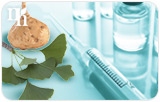
Your menopausal symptoms have gotten out of control, and you're looking for a solution. Hormone replacement therapy (HRT) seems like a good option, but you're wary of the risks. Fear not. Plenty of research has been conducted giving a realistic picture of the potential benefits and risks of HRT. Knowing what the experts say can help you make better-informed decisions about whether this option is right for you.
Keep reading to learn more about what studies say about HRT.
What Is the Medical Community's Opinion of HRT?
Like your own hormones during menopause, professional medical opinions of hormone replacement therapy have fluctuated rapidly in recent years. For decades, doctors freely prescribed the treatment to women for its effectiveness in relieving menopausal symptoms. But in 2002, a landmark study by the Women's Health Initiative changed everything. Once thought to be largely free of adverse side effects, HRT was suddenly linked to increased rates of breast cancer, stroke, and blood clots. Doctors quit prescribing the medications, and many women fled the treatment looking instead to natural remedies.

However, in the years since 2002, popular opinions of HRT have changed yet again. Some studies have linked short-term HRT with a reduced risk of osteoporosis and heart disease. While perhaps more cautious in prescribing the treatment than they were before the turn of the millennium, doctors are again recommending HRT in many cases. The decision to seek or not to seek the treatment has become a popular topic in women's health programs.
Should You Seek HRT?
Whether or not you decide to pursue HRT depends on a variety of factors. Because HRT carries many risks, you may want to ask yourself if you have pursued all other available options.
A healthy body produces healthier levels of hormones, counteracting many menopausal symptoms, so lifestyle changes like a better diet and exercise may be just the things you need. Herbs like black cohosh, ginseng, and ginkgo biloba may also help by replacing your declining estrogen levels with phytoestrogens - plant compounds that mimic the effects of human estrogen, though these also carry some side effects. However, hormone-regulating herbal supplements like Macafem, can naturally boost your hormonal production without any adverse effects.
If all other options have failed to relieve your symptoms, you may want to talk to your doctor about your treatment options, including HRT. A medical professional will be able to analyze your medical history and find the best method of treatment. Click on the following link to learn more about the multiple HRT side effects.

